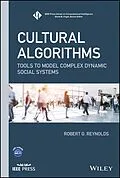A thorough look at how societies can use cultural algorithms to understand human social evolution
For those working in computational intelligence, developing an understanding of how cultural algorithms and social intelligence form the essential framework for the evolution of human social interaction is essential. This book, Cultural Algorithms: Tools to Model Complex Dynamic Social Systems, is the foundation of that study. It showcases how we can use cultural algorithms to organize social structures and develop socio-political systems that work.
For such a vast topic, the text covers everything from the history of the development of cultural algorithms and the basic framework with which it was organized. Readers will also learn how other nature-inspired algorithms can be expressed and how to use social metrics to assess the performance of various algorithms.
In addition to these topics, the book covers topics including:
* The CAT system including the Repast Simphony System and CAT Sample Runs
* How to problem solve using social networks in cultural algorithms with auctions
* Understanding Common Value Action to enhance Social Knowledge Distribution Systems
* Case studies on team formations
* An exploration of virtual worlds using cultural algorithms
For industry professionals or new students, Cultural Algorithms provides an impactful and thorough look at both social intelligence and how human social evolution translates into the modern world.
Autorentext
DR. ROBERT G. REYNOLDS is a Professor of Computer Science at Wayne State University and a Visiting Research Scientist at the University of Michigan's Museum of Anthropology. In addition to serving as the Computational Intelligence Representative to the IEEE USA Research and Development Committee, he has also been an Associate Editor for eight Intelligent System and IEEE journals.
Klappentext
A THOROUGH LOOK AT HOW SOCIETIES CAN USE CULTURAL ALGORITHMS TO UNDERSTAND HUMAN SOCIAL EVOLUTION
For those working in computational intelligence, developing an understanding of how collective intelligence emerges from the interaction of human agents over time is essential. This book, Cultural Algorithms: Tools to Model Complex Dynamic Social Systems, is the foundation of that study. It showcases how we can use cultural algorithms to organize social structures and develop socio-political systems for sustainable learning in dynamic environments.
For such a vast topic, the text covers everything from the history of the development of cultural algorithms from the standpoint of Agent-Based modeling and Complex Systems. Readers will also learn how other nature-inspired algorithms can be expressed in a cultural context and how to use social metrics to assess the performance of various cultural algorithms.
In addition to these topics, the book covers topics including:
- An overview of the Cultural Algorithms Toolkit (CAT) for prototyping Cultural Algorithms along with CAT Sample Runs
- Problem solving using social networks in cultural algorithms with auctions
- Multi-layered deep social learning with subcultures
- Use of Formal Game Theory to enhance Social Knowledge Distributio in Cultural Algorithms
- Cultural Learning as a Thermodynamic Process-the Cultural Engine as a vehicle for sustainable learning
- Multi-Objective problem solving in Cultural Algorithms
- Case studies on team formations
- An exploration of virtual worlds using Cultural Algorithms
For industry professionals or new students interested in the foundation of social intelligence, Cultural Algorithms provides an impactful and thorough look how collective intelligence can emerge over time and how human social evolution translates into the modern world.
Inhalt
List of Contributors ix
About the Companion Website xi
1 System Design Using Cultural Algorithms 1
Robert G. Reynolds
Introduction 1
The Cultural Engine 4
Outline of the Book: Cultural Learning in Dynamic Environments 6
References 10
2 The Cultural Algorithm Toolkit System 11
Thomas Palazzolo
CAT Overview 11
Downloading and Running CAT 14
The Repast Simphony System 15
Knowledge Sources 15
Fitness Functions 18
ConesWorld 19
The Logistics Function 23
CAT Sample Runs: ConesWorld 24
CAT Sample Runs: Other Problems 32
Reference 34
3 Social Learning in Cultural Algorithms with Auctions 35
Robert G. Reynolds and Leonard Kinnaird-Heether
Introduction 35
Cultural Algorithms 37
Subcultured Multi-Layered, Deep Heterogeneous Networks 40
Auction Mechanisms 42
The Cultural Engine 45
ConesWorld 47
Experimental Framework 50
Results 50
Conclusions 54
References 55
4 Using Common Value Auction in Cultural Algorithm to Enhance Robustness and Resilience of Social Knowledge Distribution Systems 57
Anas AL-Tirawi and Robert G. Reynolds
Cultural Algorithms 57
Common Value Auction 62
ConesWorld 64
Dynamic Experimental Framework 66
Results 67
Conclusions and Future Work 73
References 73
5 Optimizing AI Pipelines: A Game-Theoretic Cultural Algorithms Approach 75
Faisal Waris and Robert G. Reynolds
Introduction 75
Overview of Cultural Algorithms 77
CA Knowledge Distribution Mechanisms 78
Primer on Game Theory 80
Game- Theoretic Knowledge Distribution 81
Continuous-Action Iterated Prisoner's Dilemma 82
Test Results: Benchmark Problem 89
Test Results: Computer Vision Pipeline 92
Conclusions 95
References 96
6 Cultural Algorithms for Social Network Analysis: Case Studies in Team Formation 98
Kalyani Selvarajah, Ziad Kobti, and Mehdi Kargar
Introduction 98
Application of Social Network 99
Forming Successful Teams 99
Formulating TFP 100
Communication Cost 101
Personnel Cost 101
Distance Cost 102
Workload Balance 102
Why Artificial Intelligence? 103
Cultural Algorithms 103
Forming Teams in Coauthorship Network 104
Individual Representation 105
Fitness Function 107
Belief Space 107
Dataset and Observations 108
Skill Frequency 108
Forming Teams in Health-care Network 108
Individual Representation 113
Fitness Function 114
Dataset and Observation 115
Summary and Conclusion 117
References 117
7 Evolving Emergent Team Strategies in Robotic Soccer using Enhanced Cultural Algorithms 119
Mostafa Z. Ali, Mohammad I. Daoud, Rami Alazrai, and Robert G. Reynolds
Introduction 119
Related Work 121
The 2D Soccer Simulation Test Bed 122
Evolution of Team Strategies via Cultural Algorithm 124
Experiments and Analysis of Results 132
Conclusion 138
References 139
8 The Use of Cultural Algorithms to Learn the Impact of Climate on Local Fishing Behavior in Cerro Azul, Peru 143
Khalid Kattan, Robert G. Reynolds, and Samuel Dustin Stanley
Introduction 143
An Overview of the Cerro Azul Fishing Dataset...
